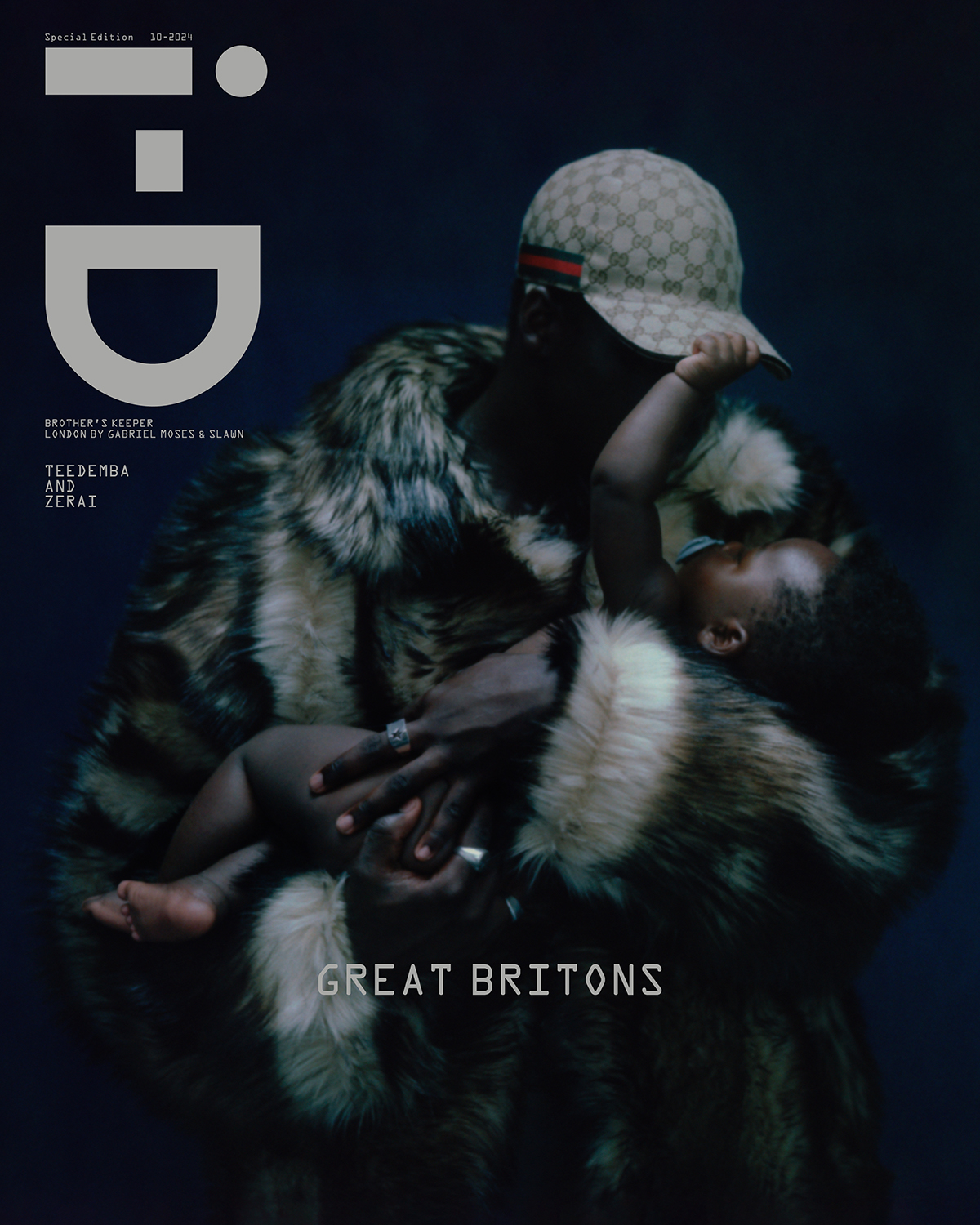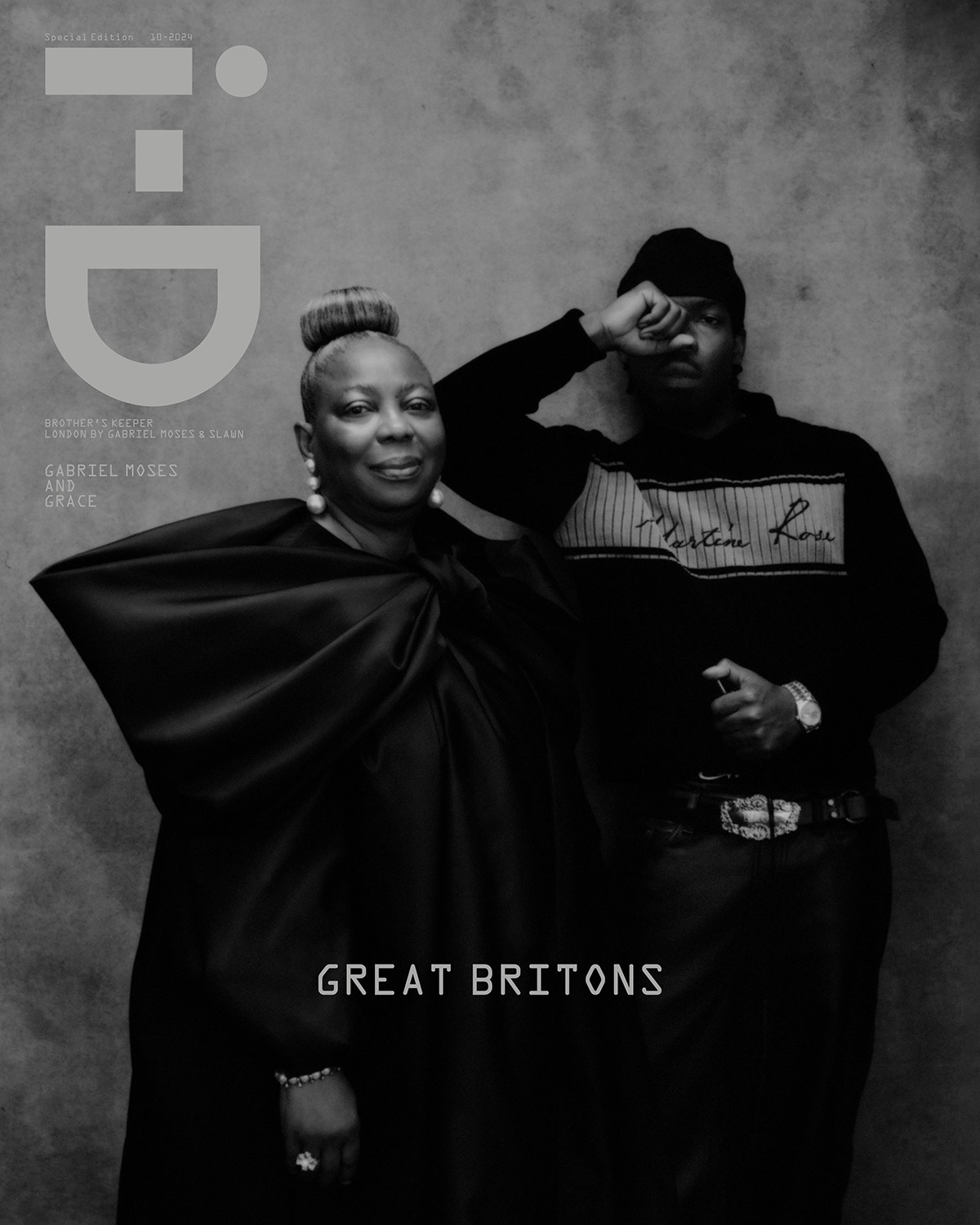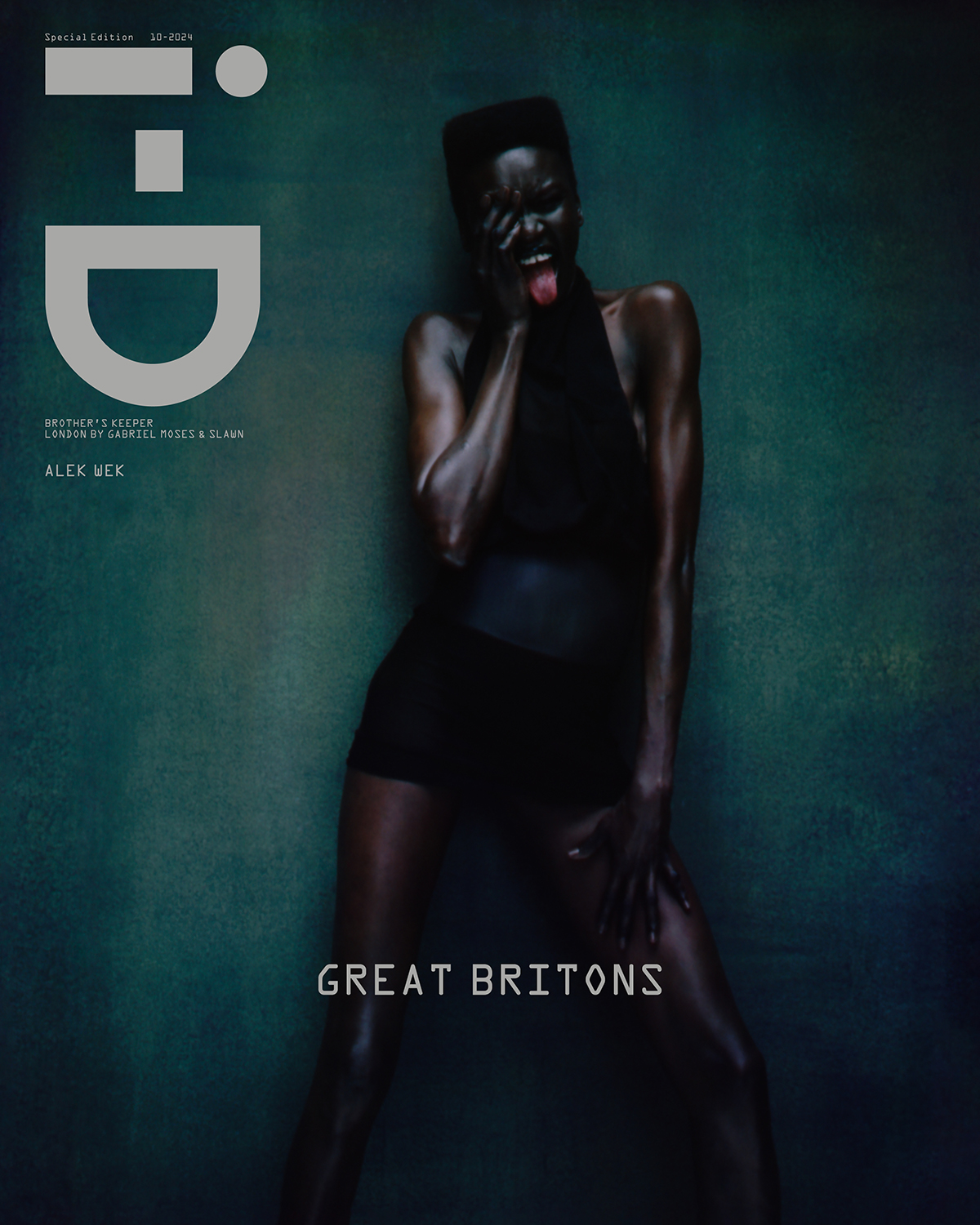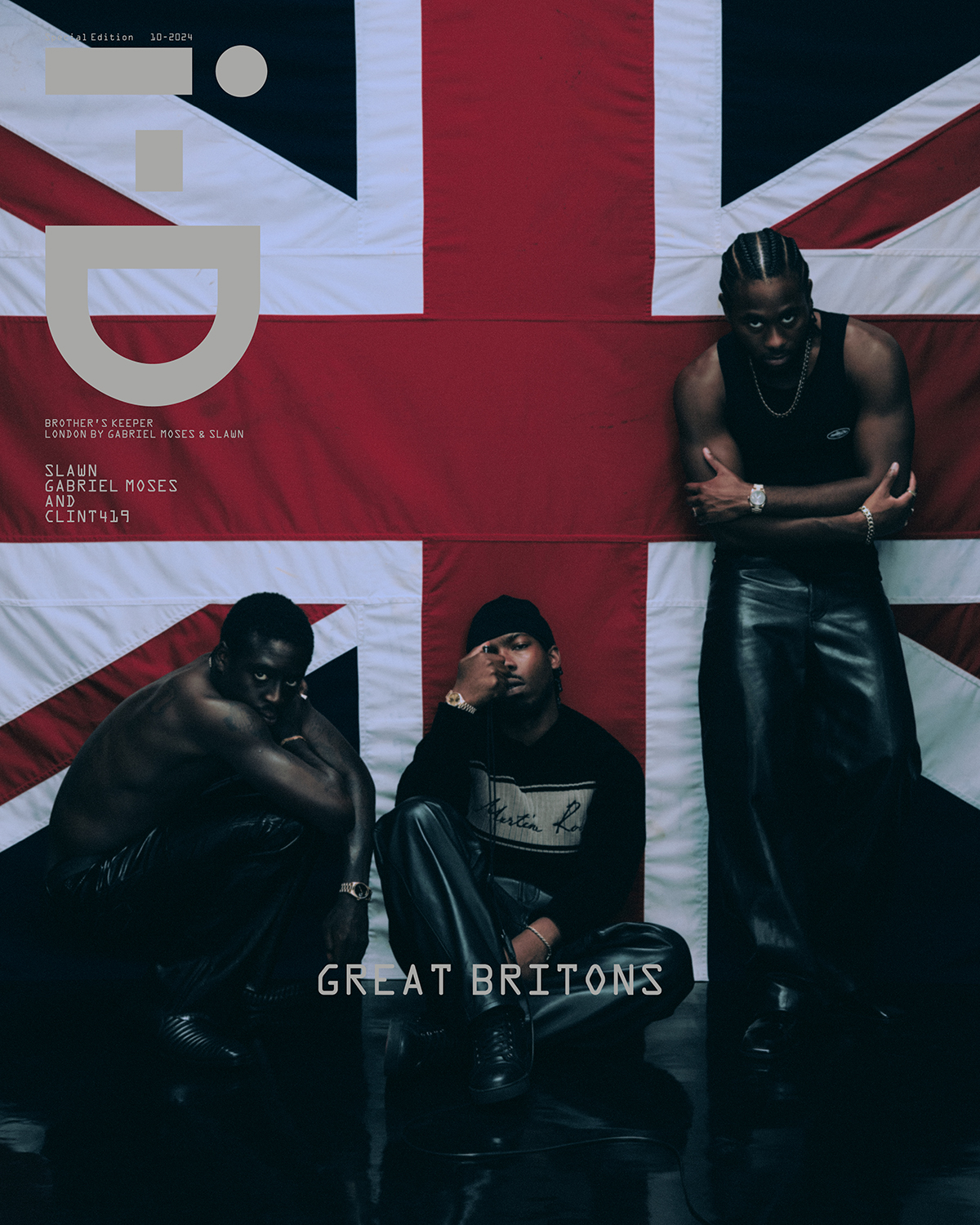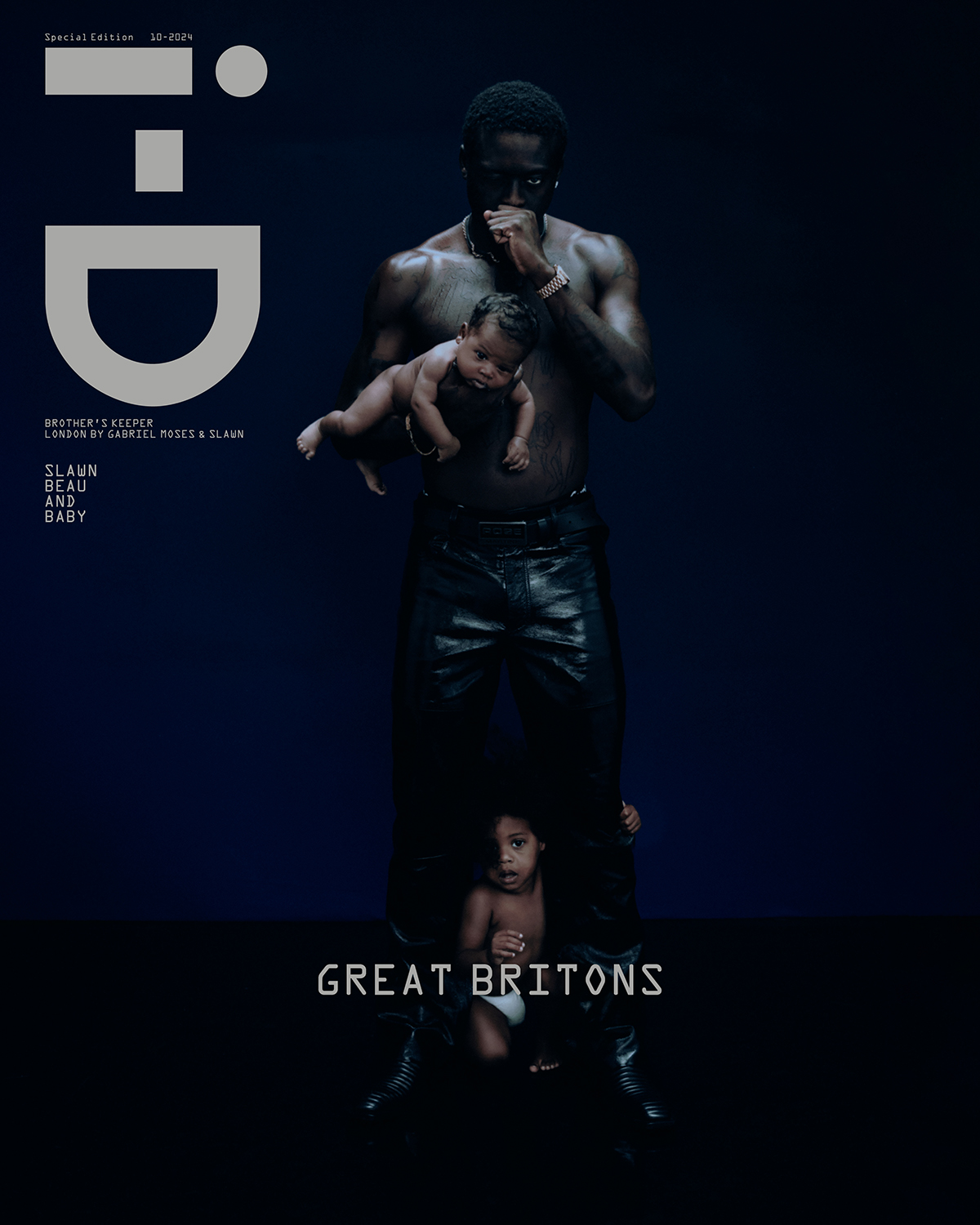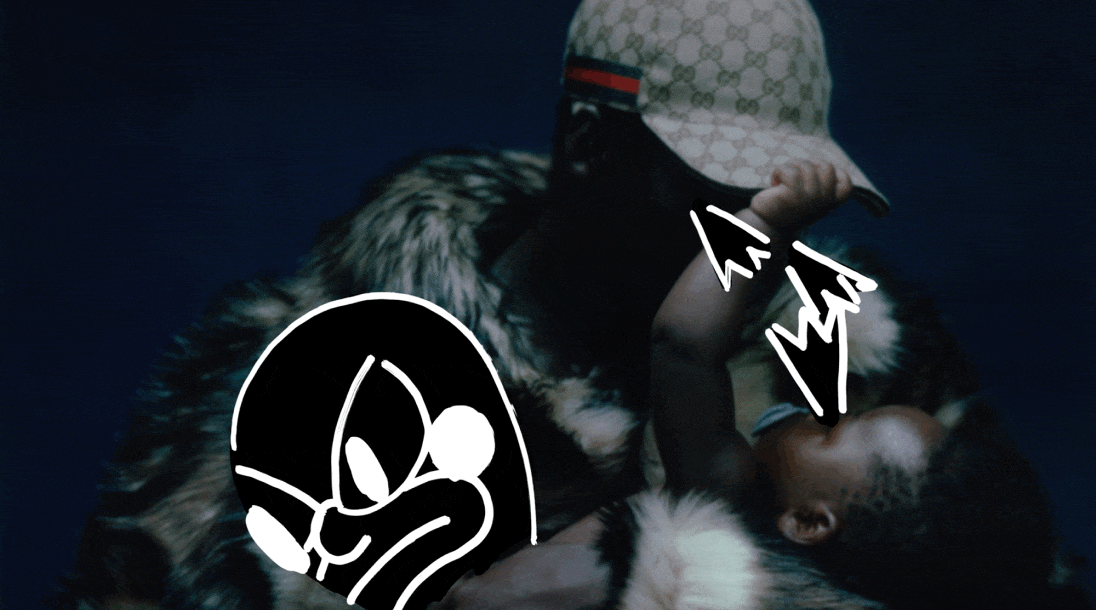This story is taken from Brothers’ Keeper, a special edition of i-D by Slawn and Gabriel Moses. Buy your copy here.
William Walsh: Tell us about your upbringing and your path to the creative space.
Slawn: I just did art because there was nothing else for me to do. It was never really about art; it was about keeping busy. Many people with ADHD will understand that you have to constantly keep doing something. So even if I wasn’t painting, I would probably be doing something else [creative]. Upbringing-wise: Jehovah Witness, Lagos, all-boys secondary school. I think you can get the picture.
How was school for you?
Slawn: Horrible, horrible, horrible. But you know what’s crazy? I still get DMs now from kids that go to my school and [they tell me] my teachers are still saying bad things about me. It’s kind of weird. I never really cared that they said bad things, but it’s like, Why are you still doing that? My principal still talks about me, saying I’m living a horrible life.
Gabriel Moses: I grew up in a single parent household, a happy one. My mum encouraged me to follow whatever bit of talent she saw in me. If it was football, she’d take me, she’d pick me up. She didn’t come [to the UK] until she was 18 years old so the one thing she asked of me was that, whatever I did, be amazing at it. It wasn’t pressure but more about putting the time in. She was a flower arranger, so she had a good appreciation of colours, and she encouraged my sister to study fashion too. I spent a lot of time in my sister’s bedroom watching TV and taking in all the references she would have on her wall.
Seeing all that can define how you see things as an adult. I didn’t really have an interest in art, but when I turned 17 or 18, my mum got ill. I didn’t know what to do. I started panicking, really, and I began to think about all the things I might be good at. I love football, so I started making little videos with my friends and then Nike [came along]. I always approached things with confidence because growing up I had my mum telling me that I was the best in the world…
Slawn: I think that’s the cure. I think that really is it. Mums make you delusional!
Gabriel Moses: She would always gas me up. Even when I wasn’t that good, I carried myself like I was. And I grew into it. I’m a Black boy from South so people look at me and my work and they can’t put two and two together. The start of my career was working out that anger, because no one got it, no one understood it. But that’s the driving force behind success so…

Has your family influenced your creative practice?
Slawn: Yeah, my dad’s side of the family, they’re all artists but failed artists. So, on my mum’s side of the family, my grandma didn’t want to let me do art. She would literally go crazy if she saw me drawing.
Gabriel Moses: My grandma was always very fly, wearing all her jewellery and posing a certain way in pictures. My mum picked that up too, so we’ve all got wavy baby pictures [laughs]. My mum was very conscious [of style] and she was obsessed with Princess Diana. If Diana was wearing something my mum might wear something similar. Style was always a thing in my family and being fly in general influenced the way I carried myself. It meant I’ve never felt like an intruder. Like Slawn was saying, love also taught you humility. As much as my mum would gas me up, she would tell me to make sure I said hello to everybody. In terms of my practice, I would see old family pictures and want to recreate them in some way, whether it’s the texture or the way in which my parents posed. They didn’t realise it was fly, they would just be themselves. These are the details that I try and put in my own pictures.
Your grandfather’s work influenced your style too, right Slawn?
Slawn: Yeah. He used to draw and carve masks and faces. It was a subconscious thing though. My morals and values come from my mum and my attitude and approach, subliminally, comes from seeing my uncles and my dad doing fly shit so that influenced a lot of my work. And, yeah, my grandfather too…
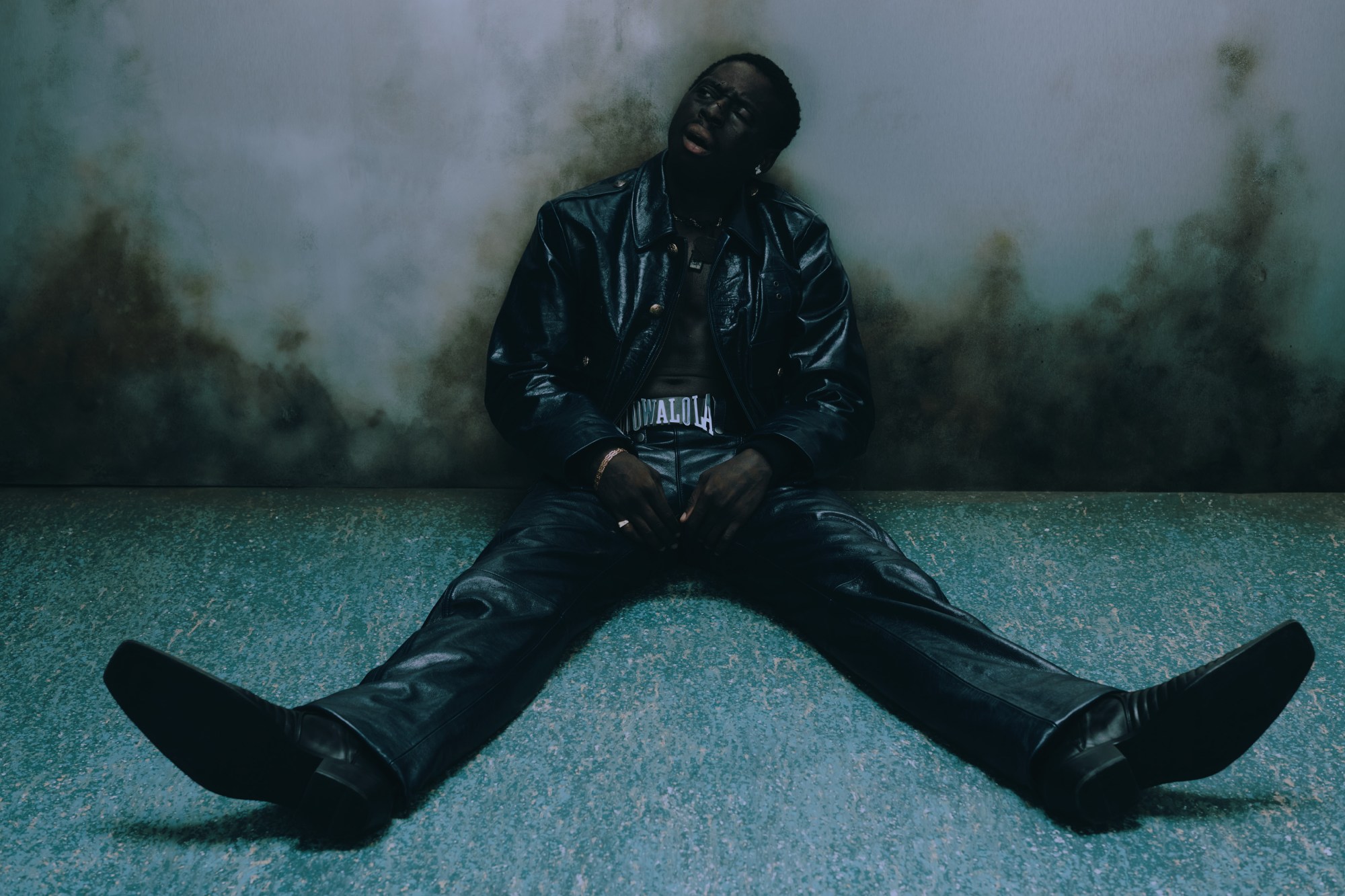
How did you guys first meet?
Gabriel Moses: I shot you.
Slawn: It was for a magazine, and I did a karate kick; I’m jumping in the air. It was one of the coldest things that has been shot of me, ever, and we did it in fifteen minutes.
Gabriel Moses: I’ve always connected with people who are themselves, because it should be normal, but it isn’t always. Anyone who seems like a normal person, it’s like, Let’s make some shit. From there it was relaxed, and we grew a bond. I think we [Clint, Slawn] all naturally inspire each other. Slawn might do something, Clint might do something and I’m just like, Oh, let me get mine. We all push each other. Now we’re in this flow where two weeks can’t go by without one of us doing something. And we’re all growing; Slawn’s got a family, you’re not gonna see Clint out and about. Me myself, I’m either working or at home in my studio. We’re so much about the work, which is one of the most inspiring things. We’re almost desensitised to the achievements. Now, it’s about what’s next. It’s mad but Slawn could paint the Eiffel Tower, and I won’t even flinch, because I expect it.
Slawn: Everything’s possible.
Gabriel Moses: It’s a healthy space where we push each other.
Slawn: For me, it’s the opposite. Every time, it’s like, How’s Gabs gonna top this? [laughs]


You are both self taught and you both had to break barriers to enter the space you’re in. How important do you think work is as opposed to talent?
Slawn: Prime example, yeah, my work is not great, it’s not boundary breaking, but it’s the fact that – and it’s kind of fucked up – but if 15 to 20 people say you stole something, even if you didn’t steal it, people are still gonna check your pockets for it. So, if 15 to 20 people say, “That’s cold,” then most of the time it gets taken as cold.
Gabriel Moses: Any hate Slawn might get is from someone who may feel like they’re entitled to what he has. That’s the beauty of it; life doesn’t work like that. There’s an energy and a spirit that we all have where, on top of being good at what we do, we’re go-getters, and we work on the front foot.
Slawn: For real.
Gabriel Moses: We don’t hold any resentment or get upset about anything we don’t have because we don’t believe we’re entitled to everything. It’s my worst nightmare to exist within this stuff and there not be respect. I’ve been doing this since I was 18 and I’ve experienced people not understanding or doubting me. Now that I’m here, why am I going to suddenly believe the world loves me? That mentality never leaves me. Tomorrow, I could lose it all. That is probably one of the biggest blessings: that we have an appreciation of the other side of the coin. We understand what it’s like to want those things and not have them. If I didn’t experience that I would be comfortable and that’s my worst nightmare.
Slawn: It’s just like a high. My body just gets high, bro. It’s a snowball thing, picking up more snow. Like what Gabs said, being comfortable is the worst thing for us. Whenever I get comfortable, I get anxious. If something’s not happening, I’m like, What the fuck. [laughs]

You’re both very fearless people. Even when facing backlash you continue to put out work – what made you willing to do that?
Gabriel Moses: I’m a Christian so I’ve always been told that your life was written before, when you were in your mother’s womb. I’m just living out every day; the destination has been sorted. Coming from a football background, I’m very competitive; I’m a terrible loser and I take that same competitive energy into art. There’s no way I’m gonna do anything and be bad at it. I hate being out of my depth in anything. The second I started making videos and taking photos, I’m like, Okay, I’m in this thing, but I need to respect the craft of what I’m doing. So that’s where the research and understanding what you’re doing and the history of it comes in.
Slawn: The destination has been sorted. That’s crazy, bro! I feel like everything in life is always in front of you. When you finally find out what’s in front of you, then you’re good. People call me a one trick pony. Yeah, I am. Bruce Lee said you practise one kick 10,000 times and then you get perfect at doing that one kick. So, I’m a one trick pony but at least I do it well. I don’t know how to actually paint properly, so I just do what I can do to the best of my ability. DIY. When I have less options, it’s more exciting.


What were your early influences on the work?
Slawn: Inspiration-wise, my dad was the main thing for me. When you’re a boy, you look up to your dad. My friends are my role models, to be honest. Like Gabs, Clint, Leo. Those are the people I draw inspiration from.
And how do we see that in your individual practice?
Gabriel Moses: For me, it was looking at things from a straightforward point of view. This is an iPhone camera: if you can afford it, we can all have the same camera so we can all take the same shot. Okay, so what sets us apart?
My mum never used to let me sleep in the dark as a kid; there would be a candle or a lamp. So before going to sleep I would see shapes and objects coming out of blackness. That way of seeing things… I knew that’s how I wanted my images to look, the second I started taking photos. It might take 15 years, but when people buy into it, they buy into it. You might only see half of their face, we may only see some of the clothes. 90% of people might hate that, but the 10%, that’s my audience. If a brand wants something specific they’re gonna come to me to shoot it because I’ve committed to that style of imagery. I’m not here to shoot everyone’s everything. My job is to be an artist. It’s about creating timeless work cos art will always live on.
I also try to work like a child, to be open and imaginative. In terms of role models, because I didn’t study this stuff in school, I didn’t have the knowledge of who’s who. I grew up in south London, where so many Black British people go on to do amazing things in football, music, film. When you find out Naomi Campbell’s just over [in Streatham] you start to walk with a certain level of arrogance. You find your confidence in knowing Rio Ferdinand grew up just there. Now I feel like I’m representing South. There’s no way I’m going to walk into this studio or that office and feel like an intruder. Knowing that people with all this success are from down the road meant I could humanise them. The first time I went to the Off-White studio and saw Virgil [Abloh], it’s like… You have to humanise someone. It makes me feel more at peace.

What impact did Virgil have on you?
Slawn: Man, that guy, he was a real dreamer but if you texted him, he would know how he could bring those ideas to fruition. He used to do it on his Notes. He’d screenshot something, paint it and send it back to [whoever]. Because he had such a wide group of people that knew things, for him, it was easy to send it to maybe this kid designer that knows how to turn the sketch into a 3D-something. He always explained to me that at the end of day, it’s not work, it’s just a game. If you learn how to play it, there’s ways to cheat: cheat codes. But he was a different breed of human, bro. I don’t know how he was texting that many people, because genuinely he would reply to you in seconds.
Gabriel Moses: I remember when he passed, that was you [Slawn] that phoned me.
Slawn: Yeah, it was crazy. We were in citizenM [hotel]. The shock. This guy really came, changed my life and died.
Gabriel Moses: With hindsight, when you put two and two together and see this guy was ill, it was then that you realised he was planting little seeds through these things he was saying to you. To see the person at the top of the chain behave like that makes you realise you don’t have to throw your weight around. It’s the person you least expect that is at the top. If you do your job, carry yourself a certain way, you’re good. All I did was shake the man’s hand but he could make you feel like you belonged. It’s not even to go too deep into what he did for us. All he had to do was exist and that was enough. What makes you live forever is the mark you’ve left on people.
Have you been inspired by each other’s work?
Slawn: Yeah, every single time I paint I try to create some of Gabs’ work in some aspect. Two of my most favourite paintings, “Moses Part One” and “Moses Part Two” are inspired by Gabs. His pictures work well with my style of work. I could paint just a fragment of his image and then put his work over mine and it works perfectly. It’s beautiful.
Gabriel Moses: With Slawn, the way he can just be chilling and then randomly pick up a can and start spraying? When he had that place in Dalston, man, he could wake up, come downstairs and start painting. Whereas I’m thinking about pre-production and all these details. So that made me relax and approach photography like an artist, like a painter. If I’m taking photos, I don’t overshoot. I’ll look through the lens and tweak the littlest things as if I’m doing a whole canvas painting. You’re not going to paint without thinking about each detail. I approach photography the same way. Painters don’t just paint for no reason. I’m not taking a hundred photos and hoping there’s a good one.
Slawn: I feel like people think our existence does not work in this universe. His work, the way he looks, the way he talks, the way his mannerisms are. How has this happened, how has he happened? It just doesn’t make sense. [From] south London, he’s always got a skull cap on, it doesn’t make sense. But that’s what makes it so good. People could try hard to copy Gabs, but you can’t. He’s impulsive. He trusts himself.
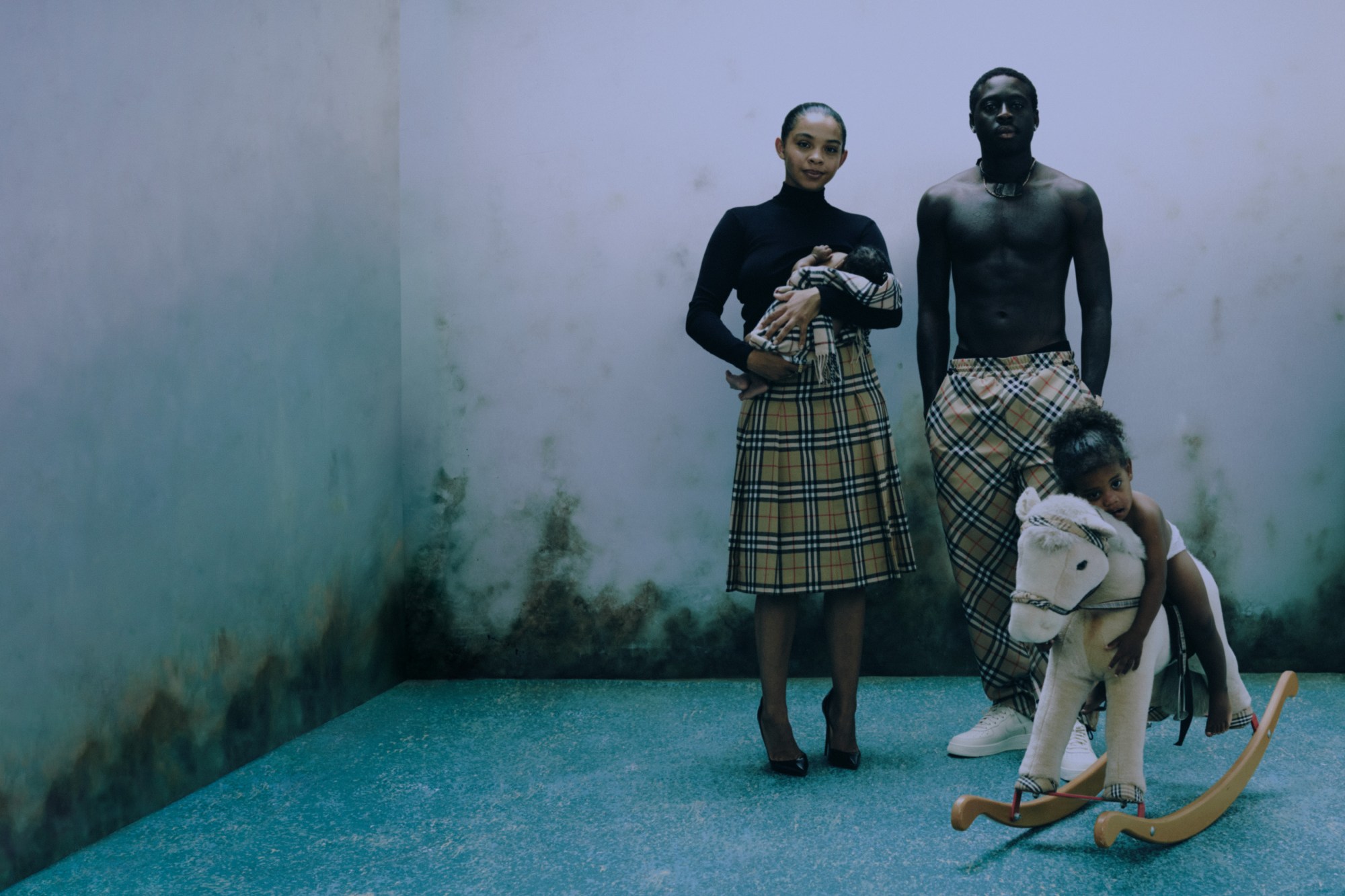
What advice would you give to the 17-year-old version of yourself?
Slawn: I don’t know. I feel like I’m still the 17-year-old version of myself. My advice would be: don’t ever duplicate [all laugh]. Don’t stop. Don’t stop. Keep throwing them stones, they’re gonna hit the targets at some point.
Gabriel Moses: I’d say, Well done. Because 17-year-old me wasn’t a bozo. I’m an old soul, I’m an old man. With my mum being ill at the time, I feel that the way I handled that… I haven’t had a conversation with her where I’m like, That’s the reason I do what I do. But just to see that she’s now healthy and she’s able to see the product of her work manifest itself. To be on a cover with my mum? It’s such a full circle moment. I did ask her a couple months ago, “How does it feel to see all of this stuff?” And she said, “I’m not surprised.” Yeah, that’s my mum.
When she met Pharrell…
Gabriel Moses: That’s what I love about my mum, she speaks to everyone like they’re her son. She’ll see Travis or Pharrell on TV, and she’ll be like, “I saw your friend!” It’s amazing for her. She’s not famous, but she’s been such a massive person in the community. She was a Sunday school teacher and she’s been feeding the homeless as long as I’ve been alive. That is someone that should be on the cover of i-D.
Credits
Photography: Gabriel Moses
Artwork: Slawn
i-D Global Creative Direction: Jamie Reid
Fashion: Gerry O’Kane
Hair: Amidat Giwa at Bryant Artists
Make-up (Tallula): Mata Mariélle at The Wall Group
Make-up and prosthetics (Slawn): Tilda Mace
Nail Technician: Edyta Betka using OPI
Set Design: Julia Dias
Movement Director: Manu Loca
Photography Assistance: Darren Karl-Smith and Jack Savage
Digital Technician: Ben Quinton
Styling Assistance: Anna Sweasey
Tailor: Della George
Hair Assistance: Avrelle Delisser, Kreszend Sackey and Funmi Oriola
Set Design Assistance: Sam Edyn, Isaac Ashley, Matthew Payne, Ellen Forbes Scenic and Ferg Lockyear
Production: Liberty Dye And Victoria Mancisidor at Concrete Rep Ltd, Thea Charlesworth at theArcade Production
Production Manager: Jeremy Rwakasiisi
Production Assistance: Kate Roswell
Retouching: The Hand Of God
Casting Director Isabel Bush at Concrete Rep Ltd
Special Thanks: Grace Rotimi and Cassia Agyeman
Models: Slawn, Tallula Christie, Baby Christie Akeredolu-ale and Beau Christie Akeredolu-ale
